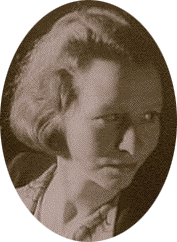
Biographic Sketch

 |
Biographic Sketch |
Deemed by Edmund Wilson as "a spokesman for the human spirit....with an intoxicating effect on people", Edna St. Vincent Millay was the first woman to receive the Pulitzer Prize for Poetry, for The Harp-Weaver and Other Poems published in 1923. Experiencing her creative heyday during the 1920's and 1930's, a time of excitement and great social change, Millay became renowned both as a "free spirit poet of early twentieth-century feminism" and an "accomplished lyric poet" who appealed to a wide-ranging and enduring audience.
With her red hair, arresting green eyes and melodious voice, the diminutive Millay, with her caustic observations, cynicism and biting wit, was a powerful voice for a young generation of women defiant of convention and experiencing with significant social change. Her classical education at Vassar was a counterpoint to her unconventional childhood and bohemian life in Greenwich Village following college, and both influences are readily seen in her work.
Millay, who often was called Vincent (her middle name is taken from the canonized French priest Vincent de Paul), wrote not only poetry, but fiction, articles for Vanity Fair magazine, numerous plays, and a libretto for The Kings Henchmen, first performed in 1927 at New York's Metropolitan Opera. She is particularly noted for her skillful rendering of the sonnet form, which has been praised for its "tension created between form and content". And later still, she became known for her rousing patriotic writings of the 1940's, during WWII. First published at the age of fourteen, Millay's won wide critical praise for Renascence, published in her first poetry collection in 1917. The publication in 1920 of A Few Figs from Thistles solidified her influence as "a free woman of her age". This was followed by the publishing of Second April (1921) and The Harp-Weaver and other Poems (1922), as well as eight Sonnets for American Poetry: A Miscellany, both of which bought the awarding of 1922's Pulitzer. She published articles during this time under the pseudonym Nancy Boyd, and published numerous major works of poetry during the rest of the 20's and 30's.
The Princess Marries the Page, a drama written while Millay was at Vassar and in which she played the leading role in 1917, was published in 1932, as was a so-called 'closet' play Conversation at Midnight in 1937. All this artistic activity won Millay much acclaim, and she was named to the National Institute of Arts and Letters in 1929, awarded the Helen Haire Levinson Prize by Poetry magazine in 1931. In 1933 she was named Laureate of the General Federation of Women's Clubs. With the advent of WWII in the early 40's, the Maine-born Millay's work took a decidedly patriotic bent, and memorable is her participation in the National Women's Party, and a 1923 statue dedication of early feminist leaders in which she read her sonnet The Pioneer, which later was dedicated to Inez Millholland, her eventual husband's first wife. Though Millay was quite open about her lesbian leanings, both in social settings and in her work, she did in 1923 marry Eugen Jan Boissevain, a Dutchman who devoted himself to the poet until his death in 1949. In later life, Millay suffered with various illnesses, and increasingly confined herself to the couple's home, Steepletop, in Austerlitz, New York. She died and was buried there in 1950. Today Steepletop is a National Historic Landmark, and the site of The Millay Colony for the Arts. Begun by her sister, Norma Millay, in 1973, the Millay Colony provides writers, composers and painters a haven for creativity in a setting of rich artistic heritage. Outspoken.....exuberant.....prolific creative talent.....a force for change during her lifetime, Edna St. Vincent Millay is today recognized for the innovative and broad nature of her thinking, and is beloved as one of America's finest lyric poets.
Renascence and Other Poems, 1917 Drama
The Lamp and the Bell, 1921 Selected Works by Edna St. Vincent Millay

|